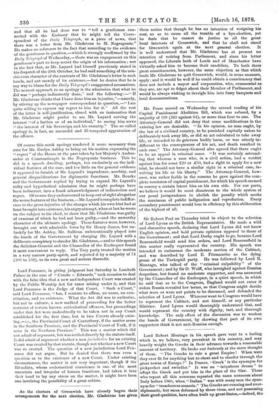Of course this mock apology rendered it more necessary than
ever for Mr. Evelyn Ashley to bring on his motion expressing the " regret " of the House at the part taken by her Majesty's Ambas- sador at Constantinople in the Negroponte business. This he did in a speech dwelling, perhaps, too exclusively on the indi- vidual features of the case, and too little on the general evidence it appeared to furnish of Mr. Layard's imprudence, acerbity, and general disqualifications for diplomatic functions. Mr. Bourke and the Government replied by trying to expand Mr. Layard's sulky and hypothetical admission that he might perhaps have been indiscreet, into a frank acknowledgment of indiscretion and regret. Of course they endeavoured to keep out of sight altogether the worse features of the business,—Mr. Layard's complete indiffer- ence to the gross injustice of the charges which his own hint had at least brought into existence, his angry attempt, when at last he wrote on the subject to his chief, to show that Mr. Gladstone was guilty of evasions of which he had not been guilty,—and the unworthy character of the ultimate apology. These features were, however, brought out with admirable force by Sir Henry James, but un- luckily for Mr. Ashley, Mr. Sullivan unintentionally played into the hands of the Government by charging Mr. Layard with a deliberate conspiracy to slander Mr. Gladstone, —and to this speech the Solicitor-General and the Chancellor of the Exchequer found it most convenient to reply. The Tory party treated the motion in a very narrow party-spirit, and rejected it by a majority of 74 (206 to 132), to its own great and serious discredit.


































 Previous page
Previous page